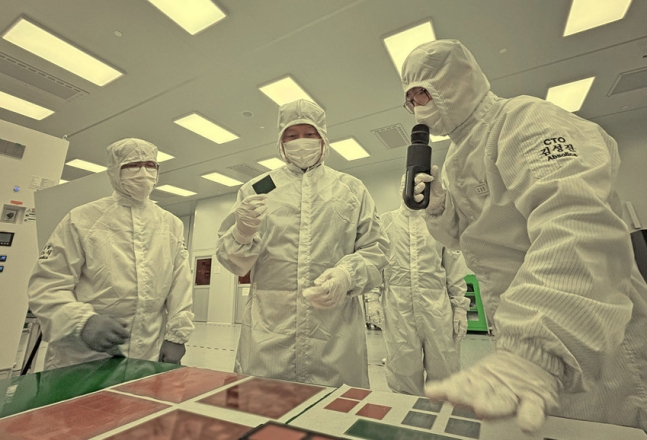
 |
| SK Group Chairman Chey Tae-won inspects the headquarters of Absolics, an advanced packaging affiliate of SKC, located in Covington, Georgia in the US on July 3. (SK Supex Council) |
South Korea's top two conglomerates Samsung Electronics and SK Group are speeding up efforts to secure an early edge in glass substrates, a "game-changer" in chipmaking that could drastically boost the data capacity and speed of semiconductors in the era of artificial intelligence.
Their leaders recently visited their respective business sites producing glass substrates, renewing their commitment to the burgeoning area that is highly likely to overcome the limits of conventional plastic substrates and elevate the performance and power efficiency of advanced chips.
Glass is considered the next generation for substrates, able to replace plastics. Compared to conventional plastic substrates, glass substrates have a smoother surface and require no interposer to mount chips on the substrate. The thinner design helps improve the chip processing speed by 40 percent while reducing power consumption by 30 percent.
After a decade of efforts to commercialize the tricky technology, Korean companies are now in the final stage to start mass production.
Absolics, the chip packaging affiliate of SKC, the chip materials business affiliated with SK Group, is one of the companies likely to mass produce glass substrates earlier than others.
In 2021, SKC established Absolics jointly with Applied Materials to develop glass substrates. The first $300 million plant, located in Covington, Georgia, is expected to have a production capacity of 12,000 square meters of glass substrates.
With the new facility, Absolics will become the first chip materials firm to receive a subsidy of $75 million under the US CHIPS and Science Act.
“We plan to start mass production in the first half of 2025,” an SKC official said. “Discussions are also underway to build the second plant with an annual production capacity of 72,000 square meters.”
The headquarters of Absolics was one of the key destinations recently for SK Group Chairman Chey Tae-won, who is on a prolonged business trip to the US.
Samsung Electronics Chairman Lee Jae-yong also recently visited the headquarters of Samsung Electro-Mechanics, which has announced plans to tap into the glass substrate market, setting 2026 as the target year for mass production.
He was briefed on the company's strategy and plans for glass substrate production, according to a company official.
Samsung Electro-Mechanics has reportedly been speeding up its process to produce the prototypes, as competitors are moving aggressively to get an upper hand in the market.
LG Innotek, the electronics parts unit of LG Group, is also reviewing its entry into the nascent market.
"One of our major clients is a US chip firm, and the company has shown great interest in glass substrates, so we are also preparing (for it)," LG Innotek Chief Executive Officer Moon Hyuk-soo said at the company's regular shareholders meeting in March.
Global tech giants are also jumping into competition in the glass substrate market. Last year, Intel announced its road map to adopt glass substrates in its chips around 2028 and said it would invest $1 billion. AMD and Nvidia are also eyeing to apply glass substrates as early as 2026.
Corning Korea's president also expressed the determination for the company to expand its presence in the burgeoning glass substrate market for semiconductors, using its special proprietary technologies this year.
The world's No. 1 plastic substrate company, Ibiden in Japan, is also looking to enter the competition in the glass substrate market. In its 2023 financial report, the company included funds in research and development for glass substrate technology.
According to market tracker Marketsandmarkets, the global glass substrate market is expected to grow at a compound annual growth rate of 3.5 percent in the coming years to reach $8.4 billion by 2028.









